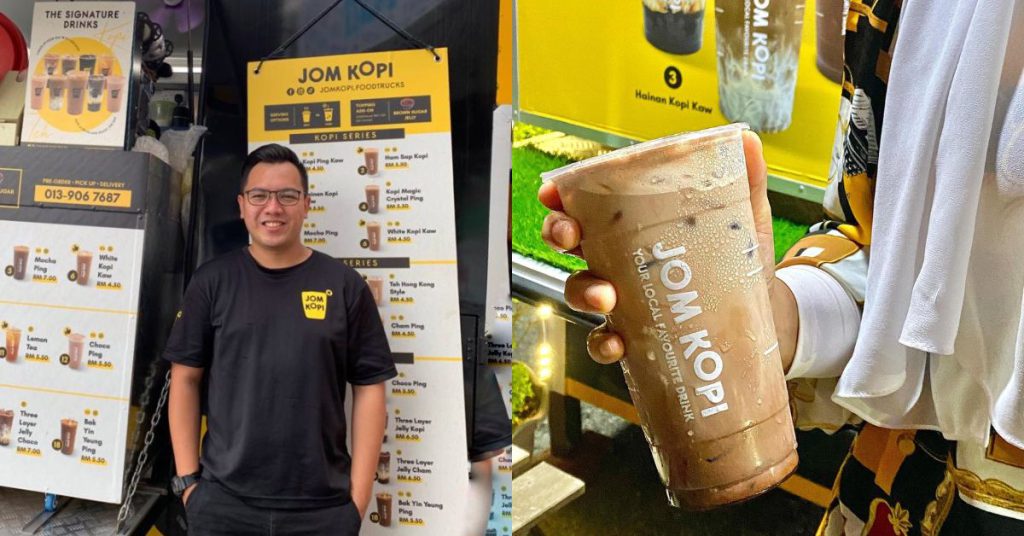Malaysia’s third-wave coffee scene is seeing a significant pick-up in the past decade or so. Other than Starbucks and The Coffee Bean & Tea Leaf, you’ve got your local ZUS Coffee, Gigi Coffee, and Bask Bear taking root brewing high-quality espresso, rounded off with a Malaysian twist.
On the other end, there are brands like Bungkus Kaw Kaw, Pak Kopi 1969, and Sai Kee Kopi championing Malaysia’s kopitiam culture, serving a traditional cuppa made fresh at affordable prices.
Jom Kopi Food Trucks (Jom Kopi) is one such player in the latter category pricing beverages between RM5.50-RM7. Established during the pandemic, it’s already got 14 food trucks parked around the Klang Valley and it even underwent a rebranding one year into operations.
Driven on caffeine through long hours
Coming from an educational background in Hotel Management, Jom Kopi’s founder, Nick, worked in Events Management for eight years, starting in 2013.
Being in the events industry, Nick was subjected to the long hours that came with the job. It was during this time that he got into drinking kopi.

Then events came to a halt when the pandemic hit. Nick knew he needed a way to generate income, and so he did something about it.
Despite having no F&B background or experience, the idea of delving into a food truck business came to his mind. To get started, Nick consulted some friends in the industry.
By October 12, 2020, he had started up his own kopi business under the name Pak Kopi. However, they would soon rebrand to Jom Kopi, and they’ve kept the new name ever since.
A matter of differentiation
On October 25, 2021, Jom Kopi stated in a Facebook post:
Due to recent feedback and confusion towards the current brand name PAK KOPI, and after long consideration, we have decided to rebrand ourselves and to avoid any mistake and miscommunication issue.
Jom Kopi in a Facebook announcement
“We came out with Jom Kopi because it’s the words that people will always say when they’re inviting [someone] for a drink,” Nick explained.

What led to the rebrand was likely how “PAK KOPI” was too similar a name to the other food truck kopi brand, Pak Kopi 1969, mentioned in the introduction.
As both brands carry the same ethos to serve affordable kopi from a truck that uses the same black and yellow colourways in their branding, their customers’ confusion seems valid.
Not to mention, there are other brick-and-mortar businesses holding similar variations of the Pak Kopi name, including Restoran Pakkopi Kaw 浓的传人白咖啡 in Puchong, and Kaw Kaw Pakkopi 濃濃白咖啡 in SS2.
Whether or not all these businesses are related is beside the point though, as it can be said that Jom Kopi is on the right track by changing its name to clear up customer confusion.
This will be crucial for continued brand differentiation, especially when it comes to scaling the business.

Despite changing the text on its logo to reflect the new name, Jom Kopi still maintains its original pictorial mark of a cup and degree symbol in yellow against a black background. It’s a way for customers to still make the connection between the old and new, however subtly.
Cruising across the city
Jom Kopi currently has 18 different items on its menu, serving up drinks you’d find in your regular kopitiam like Kopi Ping Kaw and Teh Ping Kaw, to specialty ones like Ham Sap Kopi and Hainan Kopi Kaw.

According to Nick, the Ham Sap Kopi has a stronger kick, suited for those who need that afternoon pick me up.
For caffeine-free options, Jom Kopi also serves Lemon Tea, Choco Ping, and a Three Layer Jelly Choco drink, which he shared is a customer favourite.
Made fresh daily, Jom Kopi’s 14 trucks are located around Klang Valley neighbourhoods including Subang, Cheras, Puchong, Bandar Utama, Sri Hartamas, and TTDI, to name a few.

Nick told Vulcan Post that he plans to roll out more by Q4 this year and is targeting to expand outside of the Klang Valley come Q1 2023.
While his goal is to one day set up a storefront, he stated that this won’t be happening anytime soon as the focus still remains on running Jom Kopi as a food truck business.
When the time comes though, Nick said, “We are open to franchising opportunities as we plan to grow more in the future.”
-//-
Competition is stiff in Malaysia’s coffee industry, yet it doesn’t appear as though entrepreneurs are hindered from venturing in with their personal takes on the beverage.
Selling out of a truck certainly lowers the upfront risks and barriers to entry into the F&B business, because if a specific location isn’t working out for a brand, it can opt to travel elsewhere.
On the customer-facing front, I’d say the more brands operating on food truck models, the merrier, to cover more extensive grounds.
It would be strategic for these brands to park around office areas where the working class can rely on them for their affordable, yet tasty pick-me-up in the morning, afternoon, or evening.
Featured Image Credit: Nick, founder of Jom Kopi Food Trucks











